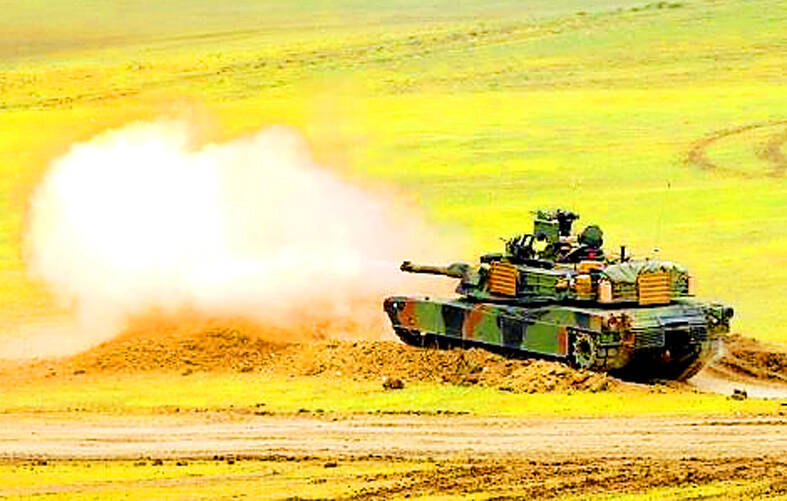The nation’s defense capability is to see a boost over the next four years, as the military is expected to acquire major equipment such as M1A2T tanks, light cruisers and F-16V jets, but production delays are likely to continue posing challenges.
With some analysts saying that Beijing is eyeing an invasion deadline of 2027, Taiwan’s military readiness over the coming years is of critical importance.
Based on the Ministry of National Defense’s published budgets, the military from now until 2027 is scheduled to receive a significant amount of new armaments.

An Abrams M1A2 tank fires a shell from a firing range emplacement in an undated photograph.
Photo: Reuters
The army is to receive delivery of 108 M1A2T Abrams main battle tanks and 29 M142 High Mobility Artillery Rocket Systems (HIMARS), while the navy is expecting nine more Tuo Chiang-class corvettes, a new type of rescue ship, the domestically developed Hai Kun (海鯤) submarine, two light cruisers and 32 shore-mounted Harpoon missile systems.
In the air force, delivery of 39 more Yung Ying (勇鷹) advanced jet trainers, 66 F-16V Block 70 jets and four MQ-9B drones are expected.
In addition, a special budget implemented from 2022 is providing the funds necessary to acquire missiles and advanced ships by 2026.
This in particular includes the Wan Chien (萬劍) cluster munitions missile optimized for striking enemy airports that is to enter mass production this year, while the Hsiung Sheng (雄昇) surface-to-surface cruise missile and Chien Hsiang (劍翔) drone for countermeasures on land are to be acquired by next year.
However, the acquisition of new equipment has not always been smooth.
Impacts over the past few years from the COVID-19 pandemic and the Russian-Ukraine war have delayed military production capacity across the globe, including that of US equipment already purchased by Taiwan.
For example, the first two of the 66 F-16Vs purchased by Taiwan were scheduled for delivery last year, and all were to be delivered by 2026.
However, the ministry in May last year updated its delivery forecast for the first batch to the third quarter of this year, although it kept the 2026 estimate for completion of the entire order.
As for the four purchased MQ-9B drones, the ministry last year told lawmakers that it hoped for delivery in two batches next year, but revised the estimate to 2027 due to flight testing, training and other factors.
Despite concerns about delays as large shipments of Javelin and TOW anti-tank missiles are being diverted to Ukraine, the ministry’s budget for this year is unchanged from last year.
The army is expecting receipt of 1,240 TOW missiles and 200 Javelin missiles this year, showing that the delivery schedule has not been affected.
Source: Taipei Times - 2024/02/13




















